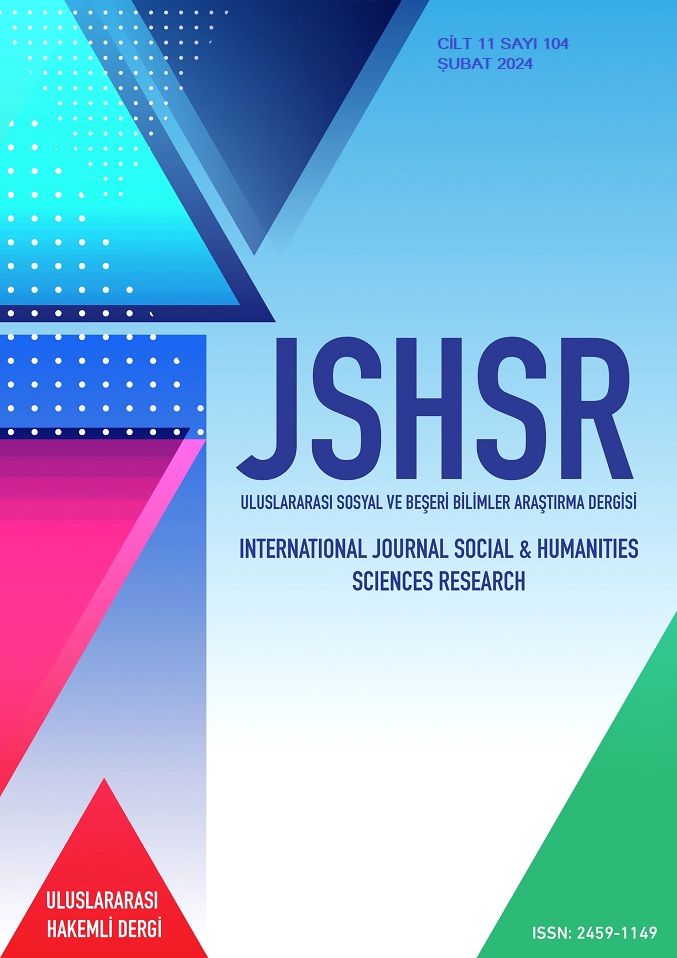An Analysis of the Situation of People Described as “Abrâr” in the Qur'an (Example of Surah al-Infitar, Verse 13)
DOI:
https://doi.org/10.5281/zenodo.10732599Keywords:
Tafsîr, The Qur’ân, Good people, Heaven, RewardAbstract
One of the common denominators of the sacred texts is calling people to goodness and beauty. The last holy and unchangeable Quran also invited people to believe in Allah and obey the prophets he sent. The Quran states that Allah Almighty left people the choice to believe or not, but he also emphasized that he would be pleased if everyone did good deeds. While the situation was at this center, many people did not complement the divine teachings and focused on their personal wishes and tendencies, while some others listened to the messages of the prophets, accepted them and applied them to their lives. The Quran describes those who obey the prophets and apply the principles and principles of religion as “abrâr/good people”. It has been clearly stated that Allah, who has absolute justice, will not consider those who believe in Him and those who do not, those who obey His Prophet and those who do not, the same (Sâd 38/28). The Quran informs the righteous people who keep their word, feed the poor, and righteous people that there will be paradise in the afterlife, where they will be rewarded with silk clothes, sit on couches, and be welcomed with countless blessings. In this study, a verse (al-İnfitâr 82/13) was taken as the center, and the commentators' comments about what the concept of “abrâr” in the Quran means in the lexical and terminological context, who are the people meant by ebrâr, and what kind of rewards will be given to them in the afterlife were analyzed.
References
Abdülbâkî, Muhammed Fuâd. el-Mü‘cemü’l-müfehres li elfâzi’l-Kur’âni’l-Kerîm. İstanbul: el-Matbaatü’l-İslâmiyye, 1982.
Bâkıllânî, Ebû Bekr Muhammed b. Tayyib b. Muhammed. Temhîdü’l-evâʾil ve telhîsü’d-delâil. thk. İmâdüddin Ahmed Haydar. Beyrût: Müessesetü’l-Kütübi’s-Sekâfiyye, 1987.
Begavî, Ebû Muhammed el-Hüseyn b. Mes‘ûd el-Ferrâ. Meâlimü’t-tenzîl fî tefsîri’l-Kur’ân. 5 Cilt. Beyrût: Dârü İhyâ et-Türâsi’l-Arabî, 1999.
Beyzâvî, Nâsıruddîn Ebû Said Abdullâh b. Ömer. Envârü’t-tenzîl ve esrârü’t-te’vîl. 5 Cilt. Beyrût: Dârü İhyâ Türâsi’l-Arabî, 1997.
Bursevî, İsmâil Hakkı. Rûhu’l-beyân. 10 Cilt. Beyrût: Dârü’l-Fikr, ts.
Ebû Bekr el-Hârizmî, Cemâlüddîn Muhammed b. Abbâs. Müfîdü’l-ʿulûm ve mübîdü’l-hümûm. Beyrût: el-Mektebetü’l-Unsuriyye, H/1418.
Ebû Hayyân el-Endülüsî, Muhammed b. Yûsuf b. Alî b. Yûsuf. el-Bahrü’l-muhît. 10 Cilt. Beyrût: Dârü’l-Fikr, 1999.
Fârâbî, Ebû İbrâhîm İshâk b. İbrâhîm. Mu‘cemu dîvâni’l-edeb. thk. Ahmed Muhtâr Ömer. 4 Cilt. Kâhire: Dârü’ş-Şa‘b, 2003.
Faysal el-Mübârek, Faysal b. Abdülaziz b. Faysal b. Hamed. Tevfîku’r-Rahmân fî dürûsi’l-Kur’ân. thk. Abdülaziz b. Abdullâh b. İbrâhîm ez-Zeyr Âl Muhammed. Riyâd: Dârü’l-‘Âsıme, 1996.
Halîmî, Ebû Abdullah el-Hüseyin b. Hasan. el-Minhâc fî şuʿabi’l-îmân. thk. Hilmî Muhammed Fûde. Dımaşk: Dârü’l-Fikr, 1979.
İbn Acîbe, Ebü’l-Abbâs Ahmed b. Muhammed b. Mehdî el-Hasenî. el-Bahrü’l-medîd fî tefsîri’l-Kurʾâni’l-mecîd. 7 Cilt. Kâhire: nşr. Hasan Abbâs Zekî, 1998.
İbn Âdil, Ebû Hafs Siracuddîn Ömer b. Ali en-Nu‘mânî. el-Lübâb fî ulûmi'l-kitâb. 20 Cilt. Beyrût: Dârü’l-Kütübi’l-İlmiyye, 1998.
İbn Atıyye el-Endülüsî, Ebû Muhammed Abdulhak b. Gâlib el-Muhâribî. el-Muharrerü’l-vecîz fî tefsîri’l-kitâbi’l-azîz. 6 Cilt. Beyrût: Dârü’l-Kütübi’l-İlmiyye, 2001.
İbn Ebû Zemenîn, Ebû Abdullâh Muhammed b. Abdullâh b. Îsâ el-Mürrî el-Kurtubî. Tefsîrü’l-Kur’âni’l-azîz. thk. Ebû Muhammed Hüseyin b. Ukkâşe-Muhammed b. Mustafa el-Kenz. 5 Cilt. Kâhire: el-Fârûku’l-Hadîse, 2002.
İbn Fûrek, Ebû Bekr Muhammed b. el-Hasen b. Fûrek el-İsfahânî. Tefsîru İbn Fûrek. thk. Alâl Abdülkâdir Bendavîş. Mekke: Camatu Ümmi’l-Kurâ, 2009.
İbnü’l-Cevzî, Ebü’l-Ferec Cemâlüddîn Abdurrahmân b. Muhammed. Zâdü’l-mesîr fî ilmi’t-tefsîr. 4 Cilt. Beyrût: Dârü’l-Kitâbi’l-Arabî. 2001.
İsfahânî, Râgıb. el-Müfredât. thk. Safvân Adnân ed-Dâvudî. Dımaşk: Dârü’l-Kalem, H/1412.
Kurtubî, Ebû Abdullâh Muhammed b. Ahmed. el-Câmiu‘li ahkâmi’l-Kur’ân. 20 Cilt. Kâhire: Dârü’l-Kütübi’l-Mısriyye, 2. Basım, 1964.
Kuşeyrî, Ebü’l-Kâsım Zeynülislâm Abdülkerîm b. Hevâzin. Letâifü’l-işârât. thk. İbrâhim el-Besyûnî. 3 Cilt. Kâhire: nşr. el-Hey’etü’l-Mısriyye, ts.
Mâverdî, Ebü’l-Hasen Alî b. Muhammed b. Habîb. Tefsîrü’l-Kurʾân (en-nüket ve’l-‘uyûn). 6 Cilt. Beyrût: Dârü’l-Kütübi’l-İlmiyye, 1992.
Mukâtil b. Süleymân, Ebü’l-Hasen b. Beşîr el-Ezdî. Tefsîr. 5 Cilt. Beyrût: Dârü İhyâ et-Türâs, 2002.
Mücâhid, Ebü’l-Haccâc b. Cebr el-Mekkî el-Mahzûmî. Tefsîrü Mücâhid. thk. Muhammed Abdüsselâm Ebü’n-Neyl. Kâhire: Dârü’l-Fikri’l-İslâmî el-Hadîsa, 1989.
Nesefî, Ebü’l-Berekât Abdullah b. Ahmed. Medârikü’t-tenzîl ve hakâiku’t-te’vîl. 3 Cilt. Beyrût: Dârü’l-Kelim et-Tayyib, 1998.
Neşvân el-Himyerî, Ebû Saîd Neşvân b. Sa‘d b. Ubeydullâh. Şemsu’l-ʿülûm ve devâʾü kelâmi’l-Arab mine’l-külûm. thk. Hüseyin b. Abdullah el-Amr–Mutahhar b. Ali el-Iryânî–Y. M. Abdullah. 11 Cilt. Beyrût: Dârü’l-Fikr el-Muâsır, 1999.
Nizâmeddin en-Nîsâbûrî, Hasen b. Muhammed b. Hüseyn. Garâibü’l-Kurʾân ve regâibü’l-furkân. thk. Zekeriyyâ Umeyrât. Beyrût: Dârü’l-Kütübi’l-İlmiyye, H/1416.
Ömer, Ahmed Muhtâr Abdülhamîd. Mü‘cemü’l-lügati’l-Arabiyye el-mu‘âsıra. 4 Cilt. Kâhire: Alemü’l-Kütüb, 2008.
Râzî, Fahrüddîn. Mefâtîhu’l-gayb. 32 Cilt. Beyrût: Dârü İhyâ et-Türâsi’l-Arabî, 1999.
Sa‘lebî, Ebû İshâk Ahmed b. Muhammed b. İbrâhîm. el-Keşf ve’l-beyân an tefsîri’l-Kurʾân. 10 Cilt. Beyrût: Dârü İhyâu’t-Türâsi’l-Arabî, 2002.
Se‘âlibî, Ebû Zeyd Abdurrahmân b. Muhammed b. Mahlûf. el-Cevâhirü’l-hisân fî tefsîri’l-Kurʾân. 5 Cilt. Beyrût: Dârü İhyâ et-Türâsi’l-Arabî, 1997.
Sem‘ânî, Ebü’l-Muzaffer Mansûr b. Muhammed b. Abdulcabbâr. thk. Ebû Temîm Yâsir b. İbrâhim-Ebû Bilâl Ganîm b. Abbas. Tefsîrü’l-Kur’ân. 6 Cilt. Riyâd: Dârü’l-Vatan, 1997.
Semerkandî, Ebü’l-Leys Nasr b. Muhammed b. Ahmed b. İbrâhîm. Bahrü’l-ulûm. thk. Muhammed Muavvız-Âdil Ahmed Abdulmevcûd. 3 Cilt. Beyrût: Dârü’l-Kütübi’l-İlmiyye, 1993.
Taberî, Ebû Ca‘fer Muhammed b. Cerîr b. Yezîd el-Âmulî. Câmiʿü’l-beyân fî te’vîli’l-Kur’ân. thk. Ahmed Muhammed Şakir. 24 Cilt. Beyrût: Müessesetü’r-Risâle, 2000.
Vâhidî, Ebü’l-Hasen Alî b. Ahmed b. Muhammed en-Nîsâbûrî. el-Vasît fî tefsîri’l-Kurʾâni’l-mecîd. thk. Komisyon. 4 Cilt. Beyrût: Dârü’l-Kütübi’l-İlmiyye, 1994.
Yolcu, Mehmet. Değerlerimiz Üslubumuz. İstanbul: Çıra Yayınları, 2021.
Zebîdî, Muhammed Murtazâ. Tâcü’l-arûs min cevâhiri’l-kâmûs. thk. Komisyon. 40 Cilt. Kâhire: Dârü’l-Hidâye, ts.
Zeccâc, Ebû İshâk İbrâhîm b. es-Serî b. Sehl el-Bağdâdî. Meʿâni’l-Kurʾân ve iʿrâbüh. 5 Cilt. Beyrût: Alemü’l-Kütüb, 1988.
Zemahşerî, Cârullâh Ebü’l-Kâsım Mahmûd b. Ömer. el-Keşşâf ‘an hakâiki gavâmidi’t-tenzîl ve uyûni’l ekâvil fî vucûhi’t-te’vîl. 4 Cilt. Beyrût: Dârü’l-Kitâbi’l-Arabî, 1987.
Downloads
Published
How to Cite
Issue
Section
License
Copyright (c) 2024 INTERNATIONAL JOURNAL OF SOCIAL HUMANITIES SCIENCES RESEARCH

This work is licensed under a Creative Commons Attribution 4.0 International License.


